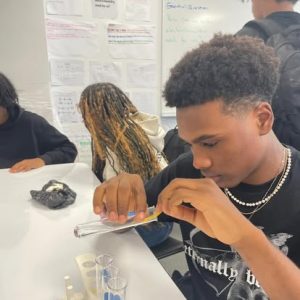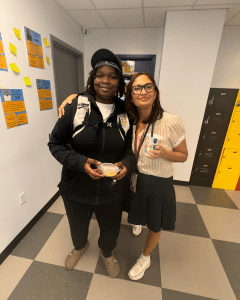The Importance of Competency-Based Education and the Mentor Mindset for Equity
CompetencyWorks Blog
In his book, “10 to 25: The Science of Motivating Young People,” developmental psychologist David Yeager, Ph.D., emphasizes that young people, especially adolescents, are highly sensitive to social dynamics, particularly how they are respected and valued by adults. Neuroscience research shows that from around age 10 through their mid-twenties, youth crave socially rewarding experiences like respect and recognition, and they are particularly vulnerable to social pain such as humiliation or shame. Yeager’s research underlines the importance of adopting a mentor mindset when engaging with students – an approach that centers on validating their perspectives, maintaining transparency, and upholding high standards.
The mentor mindset dovetails with competency based education (CBE) as two necessary frameworks for fostering educational equity, particularly for students of color. Traditional models of education, built on seat-time and rigid assessments, often fail to address the diverse needs of historically underserved students, perpetuating achievement gaps. CBE offers a more flexible, student-centered alternative, where students advance upon mastering clear, measurable skills. However, the true potential of CBE to support equitable learning is unlocked when combined with a mentor mindset, which focuses on building trust, respect, and clarity in interactions with students.
The Mentor Mindset in Action: A Key Component for Student Empowerment

For reference, South Bronx Community Charter High School (SBC) is a small charter high school serving 375 students, 90% of students qualify for free or reduced lunch. Our students come from diverse backgrounds, many 1st and 2nd generation students from the Caribbean and Latin America, and Black American students, as well as Black students from West Africa. At SBC, Yeager’s mentor mindset is fully integrated into our educational approach. This mindset acknowledges the emotional and developmental needs of our students by focusing on the respect and clarity they need to feel motivated and engaged. When students feel that their voices are heard, and their experiences are validated, they are more likely to take ownership of their learning journey.
Yeager outlines four key practices that embody the mentor mindset:
- Validating young people’s perspectives instead of dismissing them, ensuring that they feel respected and understood.
- Asking thoughtful questions rather than simply giving directives, encouraging students to think critically and engage with their education.
- Being transparent about beliefs and goals, rather than assuming students will correctly interpret adult intentions, which helps build trust and clarity.
- Holding students to high standards without coddling them, demonstrating belief in their potential and empowering them to achieve success.
These principles are fundamental in creating a learning environment where students – particularly students of color – are empowered to thrive.
Competency-Based Education: Providing Clarity and Ownership
SBC’s CBE model plays a vital role in promoting equity by providing students with clear, transparent expectations. Unlike traditional models that often leave students feeling as though their success is subject to subjective teacher opinions or confusing state testing standards, our CBE system offers students an easy-to-understand path to success. Students know exactly what competencies they need to master, giving them greater control over their learning process.
This clarity is essential for building the trust and engagement that Yeager emphasizes in his research. When students – especially those from communities that have been historically marginalized – can see a clear and direct path to success, they are more likely to engage, feel less anxious about assessments, and avoid disengagement that can result from confusion or perceived unfairness. CBE empowers students by giving them ownership over their learning, making it particularly impactful for students of color who may have experienced less agency in traditional educational environments.
Community Beacons: Culturally Relevant Mentorship as a Vehicle for Equity

The integration of the mentor mindset at SBC is further embodied through our Community Beacons staffing model, which brings young professionals of color from diverse backgrounds into the school to work alongside teachers and support students in their personal, social, and emotional development. At SBC, we employ nearly an equal complement of Community Beacons as we do academic teachers. These mentors, who are deeply rooted in community engagement and youth development, reflect the cultural backgrounds and experiences of our students. This representation is critical in creating a school environment where students feel understood, respected, and motivated to succeed.
Community Beacons go beyond academic support – they validate students’ identities and perspectives, creating a culturally responsive space where students feel seen and heard. By asking students thoughtful questions and encouraging critical thinking, Beacons empower students to take ownership of their personal and academic growth. This mentorship model, combined with CBE, ensures that students receive the individualized support they need to excel.
This holistic approach to education, where mentorship and competency-based learning intersect, is particularly important for students of color. Many of these students face systemic challenges both inside and outside the classroom, from cultural misunderstandings to implicit biases in traditional school settings. By integrating culturally relevant mentorship with CBE, SBC is addressing these inequities head-on. This work ensures that students are not only academically successful, but also empowered to become confident, self-directed learners with a strong sense of identity.
Conclusion: CBE and the Mentor Mindset – A Blueprint for Equitable Education

Together, CBE and the mentor mindset provide a comprehensive strategy for schools seeking to close equity gaps and provide students – particularly students of color – with the respect, support, and clarity they need to succeed. By focusing on mastering competencies, students gain confidence in their academic abilities, while the mentor mindset ensures that they feel validated and respected throughout their learning journey. Schools like SBC demonstrate that when students are given both the structural and emotional support they need, they thrive – not just academically but personally and socially.
As schools nationwide continue to seek solutions to the persistent inequities in education, integrating CBE with a mentor mindset offers a powerful approach that centers the needs and strengths of all students. Over the last 9 years, we have seen consistent, compelling data in two key areas: in the immediate term, students’ sense of belonging, and in the long term, students’ persistence through graduation, especially for those that need more than 4 years to get there.
Learn More
- Competency Frameworks and Content Selection at South Bronx Community Charter
- Webinar including Clemente and SBC students: An Introduction to K-12 Competency-Based Education and the blog recap
- CompetencyWorks & Coffee: Exploring Work-Based Learning as an Entry Point to CBE
 John Clemente is the Executive Director and Co-Founder of South Bronx Community Charter High School (SBC), where he leads initiatives to support competency-based learning, teacher diversity, and youth development. With a focus on equity, John’s work helps empower students to thrive academically and emotionally.
John Clemente is the Executive Director and Co-Founder of South Bronx Community Charter High School (SBC), where he leads initiatives to support competency-based learning, teacher diversity, and youth development. With a focus on equity, John’s work helps empower students to thrive academically and emotionally.